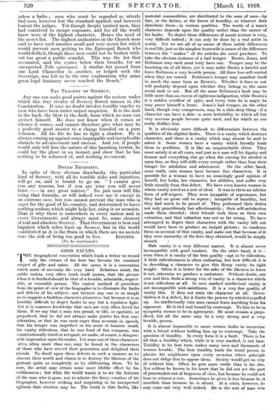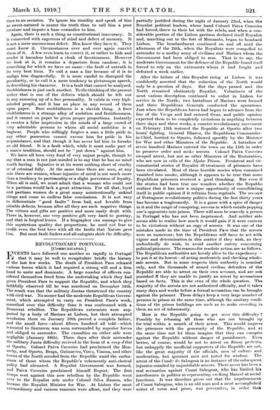GOOD FAULTS.
rilHE biographical convention which leads a writer to record only the virtues of his hero has become the constant subject of gibe and satire. All the same, it is a convention which must of necessity die very hard. Relations insist, the public insists, very often truth itself insists, that the picture when it is finished should be that of a lovable, admirable, respect- able, or venerable person. The easiest method of procedure from the point of view of the biographer is to eliminate the faults and defects of hie subject—not because any one is so simple as to suppose a faultless character attractive, but because it is so horribly difficult to depict faults in any but a repulsive light. Yet it is common knowledge that men are very often loved for them. If we say that a man was proud, or idle, or egotistic, or prejudiced, that he slid not always make justice his first con- sideration, or that he was more eager than accurate in speech, that his temper was imperfect or his sense of humour small, his vanity ridiculous, that he was fond of fine company, was constitutionally timid or arrogant, we make, of course, a disagree- able impression upont he reader. Yet some one of these character- sties, often more than one, may be found in the characters of those who have served their generation and delighted their friends. To dwell upon these defects in such a manner as to obscure their worth and charm is to destroy the likeness of the portrait quite as completely as by obliterating them. To be sure, the artist may obtain some more lifelike effect by his ruthlessness ; but what the world wants is to see the features of the man who is gone, not to admire the fancy creation of his biographer, however striking and surprising in its unexpected ugliness that creation may be. The truth is that faults, like
material commodities, are distributed to the sons of men—by fate, or the fairies, or the forces of heredity, or whoever does distribute them—in various qualities. The worth of a man's character depends upon the quality rather than the nature of his faults. To depict these differences of moral texture is very, very difficult indeed ; it can only be done by a real artist in words. Yet we are all of us aware of these subtle differences in real life, just as the simplest housewife is aware of the difference between the " makes " of the articles she must purchase. To take the obvious instance of a bad temper. Brown, Jones, and Robinson may each most truly have one. Temper may be the besetting sin of all three, yet it may make Brown a hateful and leave Robinson a very lovable person. MI three lose self-control when they are roused. Robinson's temper may manifest itself in much the same form as Brown's. Whether it does or not will probably depend upon whether they belong to the same social rank or not. But all the same Robinson's fault may be little more than an excess of righteous indignation, while Brovnt's is a sudden overflow of spite, and every time he is angry he may prove himself a brute. Jones's bad temper, on the other hand, though very conspicuous, may be a skin-deep thing—if a character can have a skin—a mere irritability to which all but very nervous people become quite used, and for which no one really dislikes him.
It is obviously more difficult to differentiate between the qualities of the slighter faults. There is a vanity which destroys character, and there is a vanity which may almost be said to adorn it. Some women have a vanity which literally leads them to perdition. It is like an unquenchable thirst. They must satisfy it at all costs, and just as a man will let dignity and honour and everything else go when the craving for alcohol is upon him, so they will stifle every scruple rather than bear their hunger for adulation and adornment. On the other hand, some really vain women have become fine characters. It is possible for a woman to have an amazingly good opinion of herself, her looks, her character, her abilities, and suffer very little morally from this defect. We have even known women in whom vanity acted as a sort of ideal. It was in them an inferior form of self-respect. They were incapable of repentance, but they had no great call to repent ; incapable of humility, but they bad much to be proud of. They performed their duties not only punctiliously but affectionately ; their self-satisfaction made them cheerful ; their friends took then; at their own valuation, and that valuation was not so far wrong. To have attempted to depict their characters with the vanity left out would have been to produce an insipid picture ; to condemn them on account of that vanity, and make out that become of it they were unworthy of the love they obtained, would be simply absurd.
Male vanity is a very different matter. It is almost never incompatible with good conduct. On the other hand, it is— even when it is vanity of the beet quality—apt to be ridiculous. A little ridiculousness is often endearing, but bow difficult it is in describing a character to give this flimsy vanity its right weight. Often it is better for the sake of the likeness to leave it out, otherwise we produce a caricature. Without doubt, one now and then finds a strong vein of vanity in a character which is not ridiculous at all. In men marked intellectual vanity is not incompatible with saintliness. It is a very fine quality of vanity this. It does not stain the character at all. Never- theless it is a defect, for it limits the powers by which it is puffed up. An intellectually vain man cannot learn anything from his opponent. He is tied and bound by contempt. To him to be in sympathy means to be in agreement. He must remain a preps. diced, but all the same may be a very strong and a very lovable, person.
It is almost impossible to name certain faults in connexion with a friend without holding him up to contempt. Take the question of timidity. In every form it is a fault. There is for all that a timidity which, while it is very marked, is not base. Timidity in its best Rim makes many men and thousands of women lovable. The best timidity leads the timid person to placate his neighbours upon every occasion where principle does not oblige him to oppose them. Society would get on very ill without him. Often he gets more credit than is his due. Not seldom he knows in his heart, that he did not act the part of peacemaker out of largeness of view, but because he could not bear to witness a row. Sometimes he gives in lest because he is unselfish than because he is afraid. At a crisis, however, he may come out very well indeed. He is the sort of man wins rises to an occasion. To ignore his timidity and speak of him as sweet-natured' is nearer the truth than to call him a poor creature and impute a base cowardice to him. '
Again, there is such a thing as constitutional inaccuracy. It is connected with eagerness of mind and defect of memory. It is not a mere unconscious defect. Men know they have it. They must know it. Circumstances over and over again convict them of it. A few even learn to correct it, or rather to hide and render it harmless behind a cloak of facetiousness. However we look at it, it remains a departure from candour; it is something for which we have no name—the fault of untruth in its very best form. To call a man a liar because of it is to malign him disgracefully. It is more candid to disregard the peculiarity, or to call it a mere tendency to picturesque speech, in describing his character. It is a fault that cannot be analysed. Snobbishness is just such another. To the thinking of the present writer that is one of the defects which should be left out in any summing up of a fine personality. It exists in very high- minded people, and it has no place in any record of them upon paper. Base snobbishness is a slavish thing. A finer snobbishness is a strange alloy of ambition and fastidiousness, and it cannot on paper be given proper proportions. Instantly it creates a false impression in the minds of a large crowd of very admirable persons to whom all social ambition is a bugbear. People who willingly forgive a man a little pride in any other possession cannot excuse him for pride in his acquaintance, and that though it has never led him to forsake an old friend. It is a fault which, while it must make part of a man's tradition, should not be " put down " against him.
We have all been very fond of very unjust people, though to say that a man is not just-minded is to Bay that he has no mind worth having. Injustice is at its worst nothing short of cruelty or of criminal folly. At the same time there are men, at any rate there are women, whose injustice of mind is not much more than a tendency to partisanship or a slight perversion of loyalty.. When all is said, we must admit that a woman who could not be a partisan would lack a great attraction. For all that, loyal and partisan women do a great many unintentionally unkind things and come to endless false conclusions. It is not easy to differentiate " good faults " from bad, and lovable from pitiable defects, because after all they are such negative things. The virtues and gifts are positive and more eerily dealt with. There is, however, one very positive gift very hard to portray, and that is forgivaLleness. If a biographer can manage to give this mysterious quality due proportions, he need not fear to credit even the best hero with all the faults that Nature gave him. But most fault-finders and all eulogists shirk the difficulty.







































 Previous page
Previous page